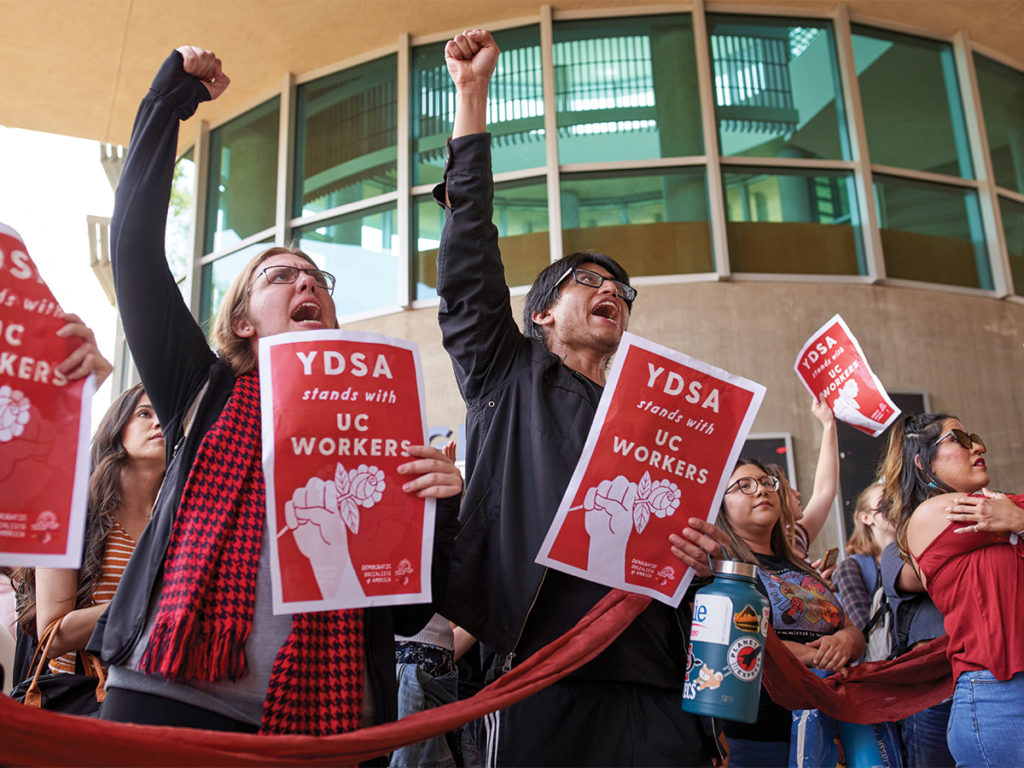Like undergraduate students, graduate students have been impacted by the spread of COVID-19 and the subsequent moves by university administration to close campus until April 30 and move the entirety of spring quarter courses to an online format. Spring quarter changes were announced just 10 days after the March 4 demonstration in demand for a cost-of-living adjustment (COLA). In light of the campus closure and the move from in-person classes, professors and TAs have had to adjust courses to accommodate for online instruction; graduate students in support of COLA have also adjusted their method of action for the movement.
Members of UCR4COLA, the group organizing for COLA on UCR’s campus, have moved their organizing online in accordance with local and state-wide measures to social distance. While COLA organizers had plans to do further in-person organizing, they have moved their efforts to online spaces while United Auto Workers (UAW) 2865 have been “polling membership for strike pledges to push the UC into negotiating for a pay increase for TAs, Readers, and Tutors,” said Amanda Riggle, an organizer for UCR4COLA and a second-year English doctoral candidate in an email interview with The Highlander. According to Riggle, the COLA movement is far from delayed despite the quarantine and campus closure. She stated that COLA organizers are not only remaining active on social networks, they are also planning for Zoom town halls within departments and with the general campus to address the next steps for the COLA movement.
According to Riggle, while COLA members have adapted, the recent events have not been an easy transition. She wrote that one of the most jarring effects of the campus closure is the inaccessibility to high-speed, reliable internet and technology. She stated, “TAs are underpaid and now, especially, overworked from their often shared living spaces … many of us don’t have the fastest internet connections because those cost more than we can afford on our pay.” In addition, she said that the move to online courses through Zoom presents a problem, as both undergraduate and graduate students lack easy access to the high-speed technology necessary to join or participate in Zoom lectures. Riggle stated that TAs have had to adapt courses with these students and students with disabilities in mind, “with little or no help from the University itself.”

In response to these issues, members of UCR4COLA have created the Riverside Mutual Aid, a group that coordinates and disseminates information about available financial resources, food aid and other necessities for students that have remained in the Riverside area. “We plan to continue on to make sure that during this health crisis that every student has access to food, necessities and shelter as we are best able to while practicing physical distancing and not spreading COVID-19,” said Riggle.
Despite these measures, Riggle expressed that she and other TAs understand that the next quarter will be a difficult transition for graduate students and undergraduate students alike. “Moving entire courses online is difficult and, depending on what department or who we’re TAing for, is a steep learning curve for the faculty we’re working with and downright impossible for the subject we’re teaching,” she stated. She also stated that UAW 2865 has conducted check-in’s with TAs to assess how they are adapting — technological assistance is not offered in the same way in each department. “I think the biggest thing undergrads can do right now is be patient and understanding,” she said.
Riggle added that undergraduates can continue to support the COLA movement by staying informed and helping disseminate information shared through their social media accounts, @ucr4cola, as well as contributing to their newsletter, Sip of Cola and one-sheet, Shot of Cola, to share how the movement has impacted them. “Another great way of helping is to talk to your TAs … Doing a wellness check on your TA and seeing if you can talk to them about COLA should be a welcome move to make and an act of solidarity on our part as an undergrad,” she concluded.








